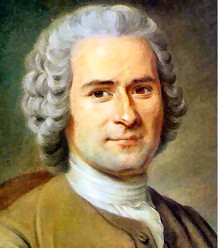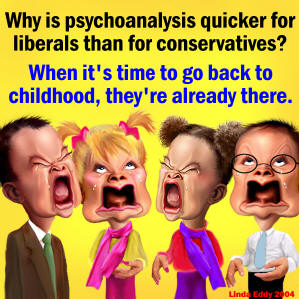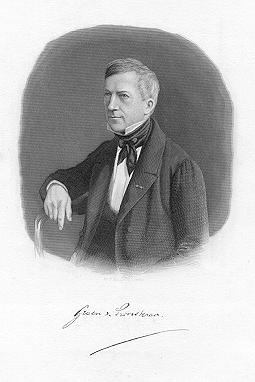"Totalitarian liberalism"?! Is that an oxymoron?
 Seemingly so, at least linguistically, since "liberality" would seem to connote nothing totalitarian. The problem, however, is the track record of a certain kind of liberalism that has been in ascendency over the last several decades. Its antecedents may be found in the outlook of Jean-Jacques Rousseau (pictured right) who declared in his Social Contract
Seemingly so, at least linguistically, since "liberality" would seem to connote nothing totalitarian. The problem, however, is the track record of a certain kind of liberalism that has been in ascendency over the last several decades. Its antecedents may be found in the outlook of Jean-Jacques Rousseau (pictured right) who declared in his Social Contract During a Great Books discussion one time, I heard a young mother from an urbane and politically very liberal Quaker family say, "When my baby grows up, I want to support her no matter what she wants to do. She can do anything she wants, I don't mind--I don't care if she wants an interracial marriage, or if she's a lesbian, or anything ... as long as she's not a Republican."
During a Great Books discussion one time, I heard a young mother from an urbane and politically very liberal Quaker family say, "When my baby grows up, I want to support her no matter what she wants to do. She can do anything she wants, I don't mind--I don't care if she wants an interracial marriage, or if she's a lesbian, or anything ... as long as she's not a Republican." Liberals don't notice it, but they are about the most illiberal people in the world when it comes to certain values. They just can't seem to see it. This is evident in a lot of the talk thse days about "tolerance" and "inclusiveness," celebrating "multicultural diversity" and "difference." What these expressions usually appear to intend is an open, welcoming attitude toward those that have been "marginalized," "victimized" and "oppressed" in various ways--such as blacks, non-Christians, gays and lesbians, women excluded from the all-male Catholic priesthood, etc. Which means that the person with probably the best chance of self-promotion and advancement today would be an anti-Catholic African-American lesbian. Or some combination of one or more of these traits.
 That's a virtually sure ticket to the talk show circuit and a top-dollar publishing contract. I know white male professors who promote themselves by embracing feminism, queer studies, trans-genderism, liberal religious revisionism, and the like. On the other hand, if you suppose for a moment that this "inclusiveness" and "celebration of diversity" means anything like the acceptance of traditional family values, Republicanism, or traditional Judeo-Christian values, you'd better think again.
That's a virtually sure ticket to the talk show circuit and a top-dollar publishing contract. I know white male professors who promote themselves by embracing feminism, queer studies, trans-genderism, liberal religious revisionism, and the like. On the other hand, if you suppose for a moment that this "inclusiveness" and "celebration of diversity" means anything like the acceptance of traditional family values, Republicanism, or traditional Judeo-Christian values, you'd better think again. Better yet, ask Phil Mitchell, who was fired from his position as professor of history at the University of Colorado last spring when one of his students objected to having to read Charles Sheldon's In His Steps
Ironically, the University of Colorado is also the academic home of Ward Churchill, the controversial, America-hating, leftist professor who wrote that those who died in the 9/11 attacks were not innocent victims but "little Eichmanns," a reference to Adolph Eichmann, the Nazi bureaucrat who implemented Hitler's Final Solution. While this cause two northeastern schools to cancel his speaking engagements, Churchill received strong backing from members of his department, who appealed to principles of free speech and academic freedom, and he remains a tenure track professor at at the university with an annual salary of $90,000. (For more on the case, read this interview with Phil Mitchell.)
 One of the most notorious contemporary critics of contemporary totalitarian liberalism, whom liberals love to hate, because she is cultured and pretty but brazenly "politically incorrect," is Ann Coulter--recently featured on the cover of TIME magazine (April 25, 2005). A regularly featured political news analyst on various network programs, she has authored numerous best-sellers, including
One of the most notorious contemporary critics of contemporary totalitarian liberalism, whom liberals love to hate, because she is cultured and pretty but brazenly "politically incorrect," is Ann Coulter--recently featured on the cover of TIME magazine (April 25, 2005). A regularly featured political news analyst on various network programs, she has authored numerous best-sellers, including - How to Talk to a Liberal (If You Must)
(2004)
- Treason: Liberal Treachery from the Cold War to the War on Terrorism
(2003)
- Slander: Liberal Lies About the American Right
(2003)
- High Crimes and Misdemeanors: The Case Against Bill Clinton
(2002).
 The TIME cover featuring Coulter sported the caption by John Cloud: "Fair and balanced she isn't. This conservative flamethrower enrages the left and delights the right. Is she serious or just having fun?" Why can't liberals figure it out? The answer, of course, is both. Why do critics of totalitarian liberalism have all the fun? Follow the humor. The trail will rarely, if ever, lead you to the door of a totalitarian liberal.
The TIME cover featuring Coulter sported the caption by John Cloud: "Fair and balanced she isn't. This conservative flamethrower enrages the left and delights the right. Is she serious or just having fun?" Why can't liberals figure it out? The answer, of course, is both. Why do critics of totalitarian liberalism have all the fun? Follow the humor. The trail will rarely, if ever, lead you to the door of a totalitarian liberal.One of the most astute scholars of totalitarian liberalism has been the Jewish Zionist and Professor of History at the Hebrew University of Jerusalem, J.L. Talmon. His most recent publication is Totalitarian Democracy and After (Cass Series--Totalitarian Movements and Political Religions)
The significance of the French Revolution (1789-1794) and the profound difference of its underlying ideology from the values of the English Revolution (1621-1688) are succinctly analyzed in Walter Lippman's visionary little book, The Public Philosophy
 in many ways be considered the theory behind the English Revolution, drafted the constitution of the original Carolina colonies.
in many ways be considered the theory behind the English Revolution, drafted the constitution of the original Carolina colonies. Another overlooked scholar whose work offers brilliant insight into the logic of the French Revolution from a Dutch Reformed perspective is Guillaume Groen van Prinsterer, who was also Prime Minster of The Netherlands from 1901-1905 and founder of the Anti-Revolutionary Party in Holland. His lectures on the subject, entitled Ongeloof en Revolutie (Unbelief and Revolution), have been partially translated into English, Lectures VIII & IX, entitled Unbelief in Religion and Politics (His Unbelief and Revolution; Lectures 8 and 9)
The point is that the totalitarian liberalism animating the thinking of Rousseau, the French Revolution, and the Bolshevik revolution has far more in common with the liberalism of the contemporary western world than the liberalism of John Locke, which represented the "liberality" of a government whose powers were restricted, on the assumption that power corrupts and absolute power corrupts absolutely, an assumption based on the Christian premise of a fallen human nature. Here's a test by which to measure the degree to which the meaning of political "liberalism" has shifted in history: "liberalism" today is associated is associated with big government politicians like Ted Kennedy, Bill & Hillary Clinton, and John Kerry; whereas the values of "liberalism" in its original sense are associated today with conservative ("that-goverment-is-best-which-governs-least") politicians like Ronald Raegan, Newt Gingerich, Pat Buchanan, and Jesse Helms. There's an irony in that. "Liberalism" used to mean what the tradition of John Locke stood for. Today it means, at least politically, the politics of big government, if not Orwellian "Big Brother" state totalitarianism.
The "politically correct" liberalism of contemporay liberal ideologues, however,
 is much more than mere political liberalism. It is an ideological allegiance, a worldview, an attitude and habit of mind that is ultimately tyrannical and even self-destructive. The scientist and philosopher, Michael Polanyi addressed the problem of such liberalism in an essay entitled "The Eclipse of Thought" in his book, Meaning
is much more than mere political liberalism. It is an ideological allegiance, a worldview, an attitude and habit of mind that is ultimately tyrannical and even self-destructive. The scientist and philosopher, Michael Polanyi addressed the problem of such liberalism in an essay entitled "The Eclipse of Thought" in his book, MeaningHere the inconsistency of liberalism based on philosophic doubt becomes apparent: freedom of thought is destroyed by the extension of doubt the the field of traditional ideals, which includes the basis for freedom of thought. (p. 10)I don't know how it could be put more succinctly than that.
 Yet another worthy work in the tradition of conservative (original) liberalism is James Burnham's Suicide of the West: An Essay on the Meaning and Destiny of Liberalism
Yet another worthy work in the tradition of conservative (original) liberalism is James Burnham's Suicide of the West: An Essay on the Meaning and Destiny of Liberalism
No comments:
Post a Comment